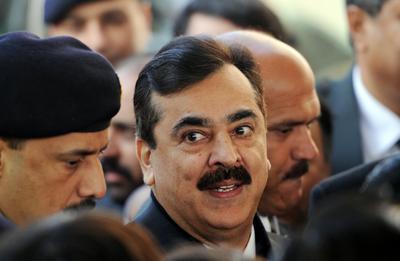A joust between a high court and a civilian government is hardly surprising in any democracy, especially one like that of Pakistan, where both courts and civilian governments have been only precariously entrenched since the republic’s foundation after partition in 1947. The latest tensions are also fuelled by a parallel showdown between Mr Zardari’s administration and the military.
As Cheema points out in one of this week’s three essays on Pakistan’s prospects: ‘Every elected leader in Pakistan’s history has been proclaimed a threat to national security at some stage by the military establishment in an effort to justify [the military’s] greater say in the country’s affairs. Pakistan has undergone three major coups, and the military has ruled the country for nearly half of its post-colonial existence’.
The current civilian-military clash was triggered by allegations that President Zardari had authorised the dispatch of a secret memo seeking US help to assert control over his generals after Osama bin Laden was killed in Pakistan. President Zardari denies this claim but the so-called memogate affair has infuriated the army, and led to accusations of treason from officers who pride themselves on martial values and view the government’s record on reform and reputation for cronyism with contempt — a view widely shared in Pakistan. A deeper vein of hurt is the sense of incompetence and helplessness born in the military out of the US capture of Osama bin Laden, the NATO strike that killed 24 Pakistani soldiers, and the humiliation of the Raymond Davis affair.
Prime Minister Gilani infuriated the military last week after he accused General Ashfaq Kayani, the army chief, and Lieutenant-General Ahmad Shuja Pasha, the head of the Inter-Services Intelligence, the top spy agency, of violating the constitution when they gave testimony to the Supreme Court investigation into ‘memogate’. The military struck back, warning that Pakistan could face ‘grievous consequences’, but Gilani defied the generals by sacking the defence secretary — the security apparatus’s top representative in the civilian bureaucracy — underscoring that the civilians believe they can still outflank the once all-powerful military.
There are few who believe that an old-style coup is in the offing although, some ask, what’s a coup by any other name?
With a Senate election due on 2 March, where the ruling Pakistan People’s Party is expected to secure a comfortable majority because of its strength in the provinces, one question is whether the Court will accelerate its proceedings against Gilani and force an early general election (not due in the normal course of events for another year).
As Cheema points out, ‘what is different in this round of tussles between the military and the elected leadership is the role of the superior judiciary’.
The Supreme Court today is different from the courts that validated previous military takeovers. Its Chief Justice was dismissed twice in 2007 by then President and military chief General Pervez Musharraf. He was restored to his position, in the face of a populist movement led by the country’s lawyers, civil society and broad coalitions of opposition political parties. The movement cost President Musharraf his grip on power, and paved the way for the general elections in early 2008 that brought the current government to power. But this same administration also refused to restore the Chief Justice and nearly 60 other superior court judges who had been unconstitutionally dismissed by the Musharraf regime — until it eventually relented in the face of the ‘Long March’ in March 2009, in which millions demonstrated their support for an independent judiciary. The bad feeling on all sides is palpable. Pakistan continues to be a country at war with itself.
The pressure to spill political blood is intense, but hard-headed calculation all round might yet keep malevolent inclinations in check. As Cheema says, what is significant about the memo incident is less that the Supreme Court has decided to side with the military and more that the military appears to have aligned itself with the courts. There is no easy way back to legitimacy for a military dictatorship, whatever the failings of the alternative.
As Pakistan lurches toward general elections, whenever they are held, the government is under pressure from all political quarters, including the courts. But the Supreme Court will not do itself or the nation any service if it is seen to play a direct role in the ouster of President Zardari and his government. Rather it will win credit if it ensures fair elections and adherence to constitutional norms and processes by all, including the military.
Therein lies the hope; the hope of restrained power. Beyond that the priority is to rebuild a languishing economy since stability in the whole region is unlikely without economic stability and better economic opportunity for Pakistan’s 180 million people.
Peter Drysdale is the Editor of the East Asia Forum.

